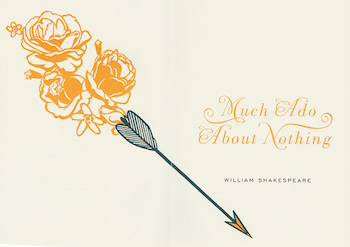We've all heard of William Shakespeare, the famous 16th century playwright who penned works like Romeo and Juliet, Hamlet, and Othello. Shakespeare's plays are still frequently performed, taught in high schools and universities, and adapted into films. Some could argue that he has been one of the most influential writers in the history of the English language. Something you might not realize, though, is just how many phrases he coined that we still use today!
Foul Play
The term "foul play" is typically used to indicate unfair or dishonest behavior. It is also often used in a sinister context, referring to criminal circumstances. "Foul play" can also refer to a bad play in a sport such as soccer. We can thank Shakespeare for introducing this phrase in plays such as Love's Labours Lost and The Tempest.
 Miranda, from Shakespeare's The Tempest, captured in a marvellous work of artCourtesy of John William Waterhouse
Miranda, from Shakespeare's The Tempest, captured in a marvellous work of artCourtesy of John William Waterhouse
All of a Sudden
The phrase "all of a sudden" is pretty self-explanatory, meaning "suddenly." Shakespeare coined this term in the play The Taming of the Shrew, which was first performed in 1593. This is one of the best ever examples of how Shakespeare's writing has inundated our language, even in its current use, because this phrase is one of the most commonly used on this list.
 Elizabeth Taylor starred in the film adaptation of The Taming of the ShrewCourtesy of Monologue ABD
Elizabeth Taylor starred in the film adaptation of The Taming of the ShrewCourtesy of Monologue ABD
Green-Eyed Monster
This term first appeared in Shakespeare's play, The Merchant of Venice, but is perhaps more memorable for its use in his later work, Othello, a story of how jealousy and obsession can tear lives apart. In the play, the meddling villain Iago calls jealousy "the green-eyed monster." Obviously, the term has stuck! Take the warning from the play, though: extreme jealousy destroys love.
 Check out this playbill for an Othello performance in 1600!Courtesy of Hudson Shakespeare
Check out this playbill for an Othello performance in 1600!Courtesy of Hudson Shakespeare
Lie Low
In Much Ado About Nothing, first performed in 1599, Shakespeare introduced the term "lie low," meaning keeping out of sight or going a bit undercover for a time. There's some speculation that the Shakespearean usage actually indicated death (as in lying low under the ground), and only in modern times has evolved into its modern meaning.
 Shakespeare coined the term "lie low" in his play Much Ado About NothingCourtesy of Kevin Jay Stanton
Shakespeare coined the term "lie low" in his play Much Ado About NothingCourtesy of Kevin Jay Stanton
Wild Goose Chase
The first recorded use of this term is in one of Shakespeare's most beloved plays, Romeo and Juliet. The phrase originally referred to a horse race in which one horse led the pack, not unlike when wild geese take flight. Not it means embarking on a fruitless search (not unlike what you might imagine chasing a wild goose would be), and interesting change from Shakespeare's meaning!
 Romeo and Juliet is one of the most romantic stories ever told!Courtesy of Magic of Movies
Romeo and Juliet is one of the most romantic stories ever told!Courtesy of Magic of Movies
One of the most fascinating things about language is watching it evolve. In the broad spectrum of language development, Shakespeare's influence has perhaps just been another drop in the bucket, but there's no arguing that his work has changed the way the English language is spoken and written today.
Have Your Say!
What's your favorite Shakespeare play? Comment below and let us know!

































